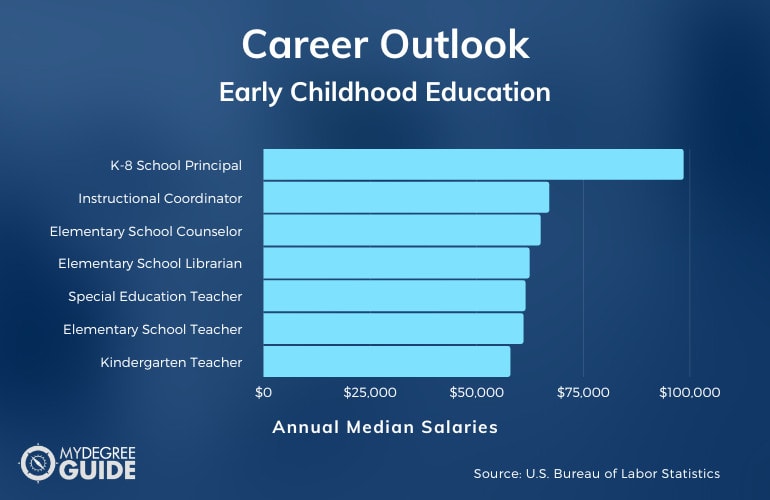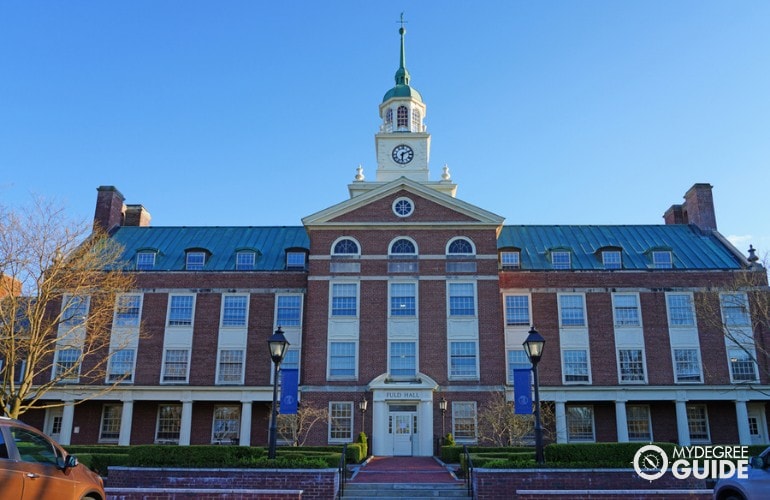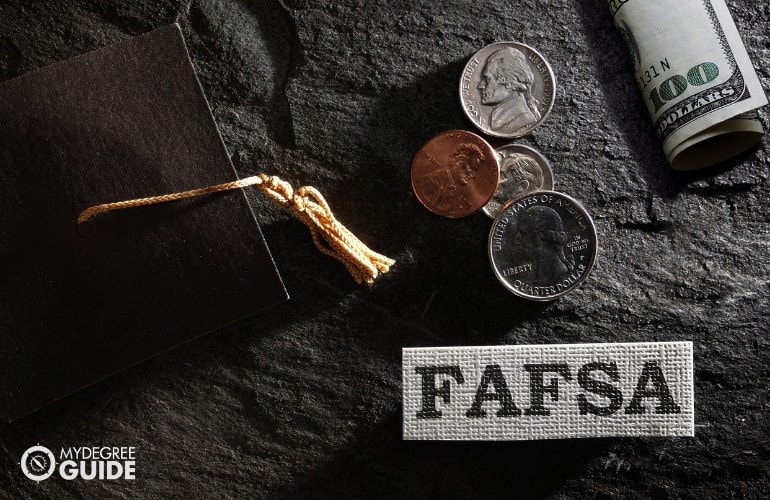Early childhood education teachers and specialists may have a powerful impact on an individual’s life, so getting your early childhood education masters online may be a great launch pad to a meaningful and rewarding career or service to others.

In addition to potentially opening doors to well-paid jobs in teaching, administration, policy work, and social work, your job may also be emotionally gratifying.
Editorial Listing ShortCode:
Getting a master’s degree in education may be a great way to get the knowledge you need to be a leader in the field, making a difference directly in young children’s lives and advocating for effective social policies on their behalf.
Universities Offering Online Master’s in Early Childhood Education Degree Programs
Methodology: The following school list is in alphabetical order. To be included, a college or university must be regionally accredited and offer degree programs online or in a hybrid format.
1. Albany State University
Albany State University’s Master of Education in Early Childhood Education program can lead to students achieving T-5 certification.
Another goal of the program is to provide educators with the skills and knowledge necessary to undertake leadership roles in early childhood education fields, particularly in developing curricula and increasing research competency.
Albany State University is accredited by the Southern Association of Colleges and Schools Commission on Colleges.
2. Arizona State University
Students enrolled in Arizona State University’s online Master of Education in Curriculum and Instruction (Early Childhood Education) program can choose a 45 credit hour certification pathway or a 30 credit hour non-certification pathway.
Featured courses of both include assessment of young children, emergent literacy, and instructional methodologies for young learners.
Arizona State University is accredited by The Higher Learning Commission.
3. Biola University
The Master of Arts in Teaching program at Biola University offers concentrations in several fields including early childhood education. Students will gain specialized knowledge in early childhood teaching techniques, childhood development and the social, cultural, spiritual, and academic needs of young learners.
Degree completion can lead to various California certifications.
Biola University is accredited by the WASC Senior College and University Commission.
4. Capella University
Capella University’s Master of Science in Education program has an early childhood education concentration that teaches students about the early childhood learning environment, research methodologies, early childhood literacy instruction, and infant and child development, among other things.
Capella lets students transfer up to 12 previously earned credits towards this master’s degree.
Capella University is accredited by the Higher Learning Commission.
5. Champlain College
The Master of Education (M.Ed.) in Early Childhood Education program at Champlain College allows students to choose specialized courses tailored to their specific career objectives, and courses are entirely flexible around students’ full-time work schedules.
Champlain College is named one of the best value schools in the country by U.S. News & World Report.
Champlain College is regionally accredited by the New England Commission of Higher Education.
6. Clemson University
The Master of Education in Teaching and Learning program at Clemson University has been ranked number one in the United States for best online graduate education programs for four years in a row by U.S. News & World Report. Students in the program can choose from one of four specializations including experiential learning for early childhood.
Clemson University is accredited by the Southern Association of Colleges and Schools Commission on Colleges.
7. Concordia University-Saint Paul
Concordia University’s Master of Arts in Education with a concentration in early childhood education is a non-licensure program designed for busy, working adults. Program participants learn to evaluate, interpret and apply research and theory in all areas of early childhood education. There’s an optional study abroad component.
Concordia University-Saint Paul is accredited by The Higher Learning Commission.
8. Jacksonville State University
Students at Jacksonville State University have a number of options when it comes to choosing a graduate program for early childhood education. Whichever path a student chooses, many of the courses are the same. Notable courses include survey of exceptional children and youth, materials and methods, and applied behavioral analysis.
Jacksonville State University is accredited by the Southern Association of Colleges and Schools Commission on Colleges.
9. Kansas State University
Kansas State University offers an online master’s in early childhood education that requires only 30 credit hours for completion. Students in the program have a 99% success rate on passing the licensing exam. The curriculum puts heavy emphasis on human development and involving students’ families in their early educational journeys.
Kansas State University is accredited by the Higher Learning Commission.
10. Kennesaw State University
The Master of Education in Early Childhood Education program at Kennesaw State University is for certified teachers wanting to increase their skills and improve their teaching capabilities.
Teachers can continue teaching and earn their degrees in as few as 13 months. There are numerous opportunities for additional certifications and endorsements.
Kennesaw State University is accredited by the Southern Association of Colleges and Schools Commission on Colleges.
11. Liberty University
Students enrolled in Liberty University’s Master of Arts in Teaching with an emphasis in special education – early childhood education program will take a faith-based approach to obtain their licensure in early childhood education.
Core courses include courses in learning theories and behavior management, along with a strong special education component.
Liberty University is accredited by the Southern Association of Colleges and Schools Commission on Colleges.
12. Martin Luther College
At Martin Luther College, students interested in early childhood education can enroll in the Master of Science in Educational Administration program, selecting the early childhood director concentration.
There are numerous courses on leadership and supervision, as well as classes in business administration, legal and ethical issues, and early childhood curriculum.
Martin Luther College is accredited by The Higher Learning Commission of the North Central Association of Colleges and Schools.
13. Mercer University
Mercer University’s Master of Education in Elementary Education program puts a premium on teaching educators to create engaging, immersive and supportive learning environments for early childhood students.
Program participants are encouraged to choose two areas of specialization from the following fields: autism, ESL, K-5 mathematics, reading, K-5 science, and STEM.
Mercer University is accredited by the Southern Association of Colleges and Schools Commission on Colleges.
14. Northern Arizona University
Students in the Master of Education Early Childhood Education program at Northern Arizona University can choose from four areas of concentration: early childhood national board preparation, early childhood multi-age, early childhood leadership and early childhood teacher.
Courses are designed to improve educators’ content, professional and pedagogical knowledge and practical skills.
NAU is accredited by the Higher Learning Commission.
15. Northwestern College
Northwestern College’s online Master’s in Early Childhood Education program offers a comprehensive curriculum tailored for educators in the early childhood sector. The curriculum covers topics such as child development, curriculum design, and inclusive classroom strategies. With accelerated courses that are only 8 weeks long and 100% online, the program is designed to accommodate the schedules of working professionals.
Northwestern College is accredited by the Higher Learning Commission.
16. Northwestern State University of Louisiana
Northwestern State University of Louisiana offers the only Master of Education in Early Childhood Education program in the state.
It’s a thesis required program that focuses on early childhood curriculum development, educational research, action research for school improvement, primary learning space design and appropriate practices for early childhood development and diversity.
Northwestern State University is accredited by the Southern Association of Colleges and Schools Commission on Colleges.
17. Pacific Oaks College
Pacific Oaks College offers a Master of Arts in Early Childhood Education that’s entirely online. It requires 30 credit hours and can be completed in two years. The goal of the program is to prepare graduates to move into leadership positions in child care programs, public schools, and state agencies.
Pacific Oaks College is accredited by the WASC Senior Colleges and Universities Commission.
18. Portland State University
Students interested in early childhood education can enroll in Portland State University’s Early Childhood: Inclusive Education and Curriculum and Instruction master’s program either on-campus, online or in a blended format. Start dates are flexible, and the entire program requires 45 credits to complete. There are study abroad opportunities as well.
Portland State University is accredited by the Northwest Commission on Colleges and Universities.
19. State University of New York – Albany
State University of New York – Albany offers an online Master of Science in Early Childhood Education program that contains courses in pre-school and elementary teaching of science, social studies and math, assessment methods, language acquisition, and literacy instruction.
Family engagement, data-based decision making and intervention are also important to the curriculum.
SUNY – Albany is accredited by
20. Stephen F Austin State University
The Master of Education in Early Childhood Education program at Stephen F. Austin State University is a 36 credit program that prepares current educators to move up in their fields. Courses can be taken in half-term formats in the fall and spring, and there are no comprehensive exams or thesis requirements.
SFASU is accredited by the Southern Association of Colleges and Schools Commission on Colleges.
21. University of Colorado – Denver
The University of Colorado offers a Master of Arts in Early Childhood Education program with an optional special education specialist licensure. The curriculum is flexible, entirely online and cohort-based. Students can personalize their degree plans, but each plan puts heavy emphasis on developing a fully inclusive learning environment for students.
CU Denver is accredited by the Higher Learning Commission.
22. University of Dayton
The University of Dayton offers both a Bachelor and a Master of Special Education in Early Childhood Leadership and Advocacy program. The master’s program is online, and it’s designed specifically for people already working in early education fields looking to expand their content knowledge and improve their teaching skills.
The University of Dayton is accredited by the Higher Learning Commission.
23. University of Houston
Students enrolled in the Master of Education in Curriculum and Instruction program at University of Houston can select a concentration in early childhood education. GRE scores are required, but once enrolled, students must only complete 30 credits to graduate.
Graduates should be prepared for leadership roles in metropolitan school settings.
The University of Houston is accredited by the Commission on Colleges of the Southern Association of Colleges and Schools.
24. University of Missouri
The University of Missouri offers a concentration in early childhood education as part of its Master of Education in Learning, Teaching and Curriculum program. The program is TEAC accredited and can be completed entirely online. It does not provide students with certification, but may lead to higher paying jobs for current educators.
The University of Missouri is accredited by the Higher Learning Commission.
25. University of North Dakota
University of North Dakota’s Master of Science in Early Childhood Education program is a non-licensure program that’s accredited by the CAEP and NAEYC. It prepares students to meet the academic needs of children aged eight and younger. Its education program is named as one of the best in the country by U.S. News & World Report.
The University of North Dakota is accredited by the Higher Learning Commission of the North Central Association of Colleges and Schools.
26. University of South Alabama
The Master of Education in Early Childhood Education program at University of South Alabama is a 30 credit hour program that can lead to professional licensure.
Notable courses in the curriculum include recognizing diversity, elementary school curriculum, instructional planning in the elementary school, language development in elementary school, and microcomputing.
The University of South Alabama is accredited by the Southern Association of Colleges and Schools, Commission on Colleges.
27. University of Toledo
Students at the University of Toledo not seeking licensure can enroll in the school’s Master of Education in Early Childhood Education program. The school prides itself on teaching with the most up-to-date information on educational theory, research, and practices. Participants learn to work with families for the benefit of students.
The University of Toledo is accredited by the Higher Learning Commission.
28. University of West Alabama
The 34 credit hour Master of Education in Early Childhood Education P-3 program at University of West Alabama includes 19 hours of professional courses and 15 of teaching courses. Students in the program will be signed up for UWA’s Mentor Collective, which pairs them with mentors to help them succeed.
The University of West Alabama is accredited by the Southern Association of Colleges and Schools Commission on Colleges.
29. Walden University
Walden University’s early childhood education program was named by Intelligent as one of the best in the country. There are two ways for students to earn its degrees. One is through traditional, course-based online study, and one is through Walden’s Tempo Competency-Based Learning, which allows students to work entirely at their own paces.
Walden is accredited by The Higher Learning Commission.
30. West Chester University
At West Chester University, students can enroll in the Master of Education in Early Childhood Education program choosing one of two tracks: the accomplished teachers track or the administrators track.
Both tracks require 33 credit hours to complete, and both put emphasis on leadership, child development, and understanding research methods.
West Chester University is accredited by the Middle States Commission on Higher Education.
Early Childhood Education Master’s Online

Getting a master’s degree means you really do a deep dive into both foundational theories and cutting-edge research in the field of early childhood education. Part of what makes college study in this field so fascinating is that you explore pedagogical theories, child psychology, social work, and social policy perspectives.
You may learn proven methods that really deliver the best outcomes for high-needs children and have a foundation for leadership roles and coaching roles and for policy and advocacy work.
With a masters in early childhood education you may learn advanced instructional skills as well as intervention methods that can help children suffering from trauma, behavior disorders, or learning disabilities. You may also get beneficial training on setting up classrooms and managing groups.
In fact, not only may you gain valuable teaching expertise, you may be positioned to take roles coaching and mentoring other teachers—in lesson design, reading interventions, and classroom management.
If you have your sights on a non-teaching role, your degree may also open doors to work in social services and in early childhood education program administration. If you’re familiar with and interested in the Montessori or Waldorf methods, you’ll find that some programs also provide pathways for these concentrations.
Other concentrations include ESL/Bilingual education, special education services, reading specialist, and policy and advocacy research.
Early Childhood Education Careers & Salaries

Based on your professional interests, you can choose from many concentrations in the education field involving young children.
These include:
- Working with special needs children
- Special education case management
- ESL or Bilingual instruction
- Reading or literacy specialist
- School administration
- Working with Montessori-based or Waldorf-based programs
Some early childhood development specialists work in private, nonprofit, or government agencies as social workers, family resource specialists, or occupational therapy assistants. Others enjoy providing specialized behavioral or academic support services, as school employees or in tandem with agencies supporting schools.
Keep in mind that many school and non-school jobs in this field also require state licensure or permitting requirements and criminal background checks. According to the Bureau of Labor Statistics, the kinds of occupations you may pursue with your masters in early childhood education online often pay around $50,000 and above:
| Careers | Annual Median Salary |
| K-8 School Principal | $98,490 |
| Instructional Coordinator | $66,970 |
| Elementary School Counselor | $64,960 |
| Elementary School Librarian | $62,370 |
| Special Education Teacher | $61,420 |
| Elementary School Teacher | $60,940 |
| Kindergarten Teacher | $57,860 |
| Social Worker | $51,760 |
| Preschool and Childcare Center Director | $49,160 |
| Health Educator or Community Health Worker | $48,140 |
While your master’s degree in early childhood education online may help equip you for a teaching or administration role, salaries often vary based on your role and the type of school or agency you work for.
Choosing an Online Early Childhood Education Master’s Program
It’s always important to choose a program with academic concentrations well aligned with your professional interests and based on other personal preferences, such as flexible schedules or accelerated completion timelines.
Here are some program features you may want to consider as you compare programs:
- Licensing. If you’re interested in teaching, you may find that some programs include more direct help with completing state-mandated licensing requirements.
- Practicum. State licensure or hiring for state schools or certain private schools may require you complete a practicum or internship. Some programs may provide you direct entry into these kinds of field-study opportunities, others many not.
- Specializations. Look for options to focus on specific specializations aligned with your professional goals. Common areas of concentration in early childhood online degree programs include support for special education licensure or ESL/Bilingual Education licensure. Some programs have concentrations preparing teachers for teaching in or leading Montessori or Waldorf programs.
- Capstone or Thesis. Some masters in early childhood education online require a special capstone project, such as a thesis, in addition to more traditional course requirements.
- Flexibility. Consider enrollment and completion timelines as well as other flexible scheduling options, based on your needs and interests.
As you compare schools and programs, you should quickly get a better sense of what kind of concentrations are offered and which ones most speak to your own professional interests.
Early Childhood Education Curriculum & Courses

In most early childhood education masters programs, you’ll study everything from theories about the development of moral psychology and language acquisition to classroom management and program administration.
Here’s a sample of the kinds of courses you can expect:
- Early Childhood Development: This course provides a grounding in core knowledge and theories related to child development, including physical and mental health, language and motor skills, social and environmental influences, cognitive and emotional growth.
- Study of Early Childhood Psychology: Learn about how children develop their sense of self and how they perceive others as they develop agency, feelings, values, and moral concepts.
- Pedagogy (grades PreK-8): Students deepen their knowledge of dominant theories of learning and teaching relating to children ages one through eight.
- Curriculum Planning: This course gives students advanced skills in best practices for effective curriculum design and lesson planning.
- Learning Environments: Learn how to provide safe and stimulating physical and emotional learning environments for the youngest learners with insights into early childhood behaviors and group dynamics.
- Literacy and Language Acquisition: Students get advanced instruction in core concepts of developmental reading and language acquisition processes to apply in language and reading instruction and specialized assessments and interventions.
- Math Instruction in grades K-8: Learn about theories, approaches, methods, and resources for effective math instruction and math support in the early grades.
- Assessing Young Children: Whether it’s social emotional growth or academic progress, learn methods for strategic assessment of student progress and techniques for identifying special needs that may require formal interventions or referrals.
- Administration Services and Leadership: Students learn the leadership skills needed to be effective preschool directors or to move into K-8 administrative roles.
- Methods and Standards for Educational Research: Whether for your own dissertation research or for future policy work, you’ll learn how to design reliable research models and interpret and evaluate others’ research findings related to early childhood education and public policy.
Keep in mind that a master’s program will likely also engage you in original research and require a thesis or additional coursework in lieu of a thesis.
Online Master’s Degree Admissions Requirements

If you already have a bachelor’s degree in education or a related field and a satisfactory undergraduate GPA, you’re probably eligible to start an early childhood education masters online.
Most schools will ask you to provide evidence of your undergraduate degree along with transcripts for all undergraduate coursework. In most cases you may need to have already completed a bachelor’s degree in a related field such as education or psychology.
Some schools may also require a GRE or GMAT score or prior teacher licensing as part of admission requirements.
Early Childhood Education Programs Accreditation

We recommend selecting a master’s degree program at a fully accredited school. Sticking with accredited schools will help ensure that you’re getting the right standard of academic instruction and that your coursework and credentials are honored by other colleges, prospective employers, and state licensing boards.
Organizations such as CHEA (Council for Higher Education Accreditation) have information about the accreditation process, why it’s important, and may help you find accredited schools.
Financial Aid and Scholarships

You may be wondering how you will pay tuition and other expenses while completing your early childhood education masters program. Common forms of financial aid include federal and state student loan programs.
You may also be eligible for a state or federal loan forgiveness program or educational grant or scholarship, especially if you plan to work as a teacher. If you’re already working in a job related to early childhood education, your employer may offer tuition assistance as an incentive for continued learning.
If you are interested in educational loans, it’s always a good idea to submit your application for federal student aid as soon as possible (FAFSA).
What Can You Do With an Early Childhood Education Masters Degree?

Your masters in early childhood education might be evidence that you’re highly qualified as a professional who can support children at an age of critical developmental growth.
According to the Bureau of Labor Statistics, your master’s degree in early childhood education helps prepare you for occupations such as teacher, instructional coordinator, special education teacher, behavior support specialist, reading specialist, or ESL instructor.
With the proper work experience and licensing, you may also qualify to work as a childcare center director or preschool director. You may find some online degree programs supporting training for those who want to work in Montessori or Waldorf schools as well.
Your degree may also open doors to jobs where you can help support young children as a social worker or helping with behavioral or occupational therapy services. If you are looking for even more opportunities, consider pursuing a PhD in early childhood education online.
How Much Does an Early Childhood Education Master’s Degree Cost?

Tuition costs will vary by schools and programs. You should find tuition costing between $360 to $800 per credit hour for degree programs that require somewhere between 30 and 38 credit hours.
If you choose a program that includes a field study or practicum, check if that requires additional costs or is already included in the regular tuition.
Also keep in mind that some state schools may offer more affordable tuition to qualifying state residents. However, in many cases, universities will charge the same rate of tuition for all online students, regardless of their state of residence.
How Long Does it Take to Get an Early Childhood Education Masters Online?
If you follow a traditional 16 week full-time schedule, you’ll typically need about two years to complete your masters in early childhood education online. If you follow an 8 week semester and stay enrolled continuously year-round, you may be able to finish more quickly.
If your masters program online requires a thesis, that may extend the time it takes to obtain your degree. Many online programs are tailored for flexible scheduling or to help students complete a degree program with an accelerated timeline. Keep this in mind as you compare options.
Are There Any Affordable Early Childhood Education Master’s Online?

Yes, there are more affordable programs out there. A number of schools offer online programs with very competitive tuition rates.
It’s always a good idea to balance your cost interests with other factors related to your academic and professional goals and to avoid schools and programs that are not accredited. Generally, you should find more affordable tuition rates cost about $360 to $500 per credit hour.
Many public colleges also offer discounted tuition rates for qualifying state residents. If you want to take advantage of such discounts, be sure to check the requirements for resident status.
What Jobs Can You Get With a Masters Degree in Early Childhood Education?

You may not always need a master’s degree to get a teaching job, but many teachers choose to pursue one. A masters degree can help teachers earn better pay or additional educator stipends. It also can help teachers promote into roles as instructional leaders. Other jobs include special education teacher, ESL specialist, and literacy coach.
There are also positions in school administration that you may qualify for with your early childhood education masters and the proper work experience. These positions include childcare center director or elementary school principal.
You might also be a good candidate for jobs at nonprofit and government agencies supporting young children’s social-emotional welfare and special learning challenges. Keep in mind that qualifying for many of these jobs can involve state licensure or certification requirements in addition to academic degrees.
Is an Early Childhood Education Masters Worth it?

Yes, getting an early childhood masters online is worth it for many students. In education, training, and library field, jobs are projected to grow at a rate of 5% in the next 10 years (Bureau of Labor Statistics), faster than the average for all occupations.
Common early childhood education careers in this field include teacher, instructional specialist, instructional coordinator, special education teacher, social worker, preschool, and childcare center director.
Your master’s degree in early childhood education may make you a highly valued candidate for the careers you may pursue. In fact, with your advanced academic training, you might find yourself able to provide valuable, evidence-based, and life-enhancing support services to young people, their schools, and families.
Getting Your Early Childhood Education Masters Degree Online

More and more, experts in the field of early childhood education are discovering just how formative children’s first years are for their ongoing learning, development, and wellbeing.
With an online early childhood master’s degree you may be prepared to make a lasting impact on a young person’s life and future while creating broad returns on social investments over the long term.
If you love the magic of interacting with young children and have a heart for children with exceptional needs and challenges, you may be well suited for this career path, rewarded with both good pay and heartwarming moments.
